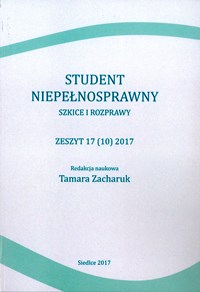Dog-therapy as a method to support the development of persons with intellectual disability – some aspects
Abstract
Dog-therapy is the most natural way to "smuggle" difficult and sometimes tedious exercises supporting the rehabilitation of children and young people mentally or physically disabled with the help of dogs properly selected, prepared and trained for this purpose. Research [Boguszewski, 2013] exhibit excellent effect of contact with the dog on the health and human psyche regardless of age, gender, state of health or the level of disability. The article deals with the issue of cooperation in the dog-therapist's support of the treatment of people with intellectual disabilities, Down syndrome and autism spectrum. Article identifies the main areas of the use of dogs in the rehabilitation of people, analyzes available scientific literature on this subject and the results of studies, including the World Health Organization [Karwacka, 2006], the research on the canine impact on the human body conducted by K. Allen from the University at Buffalo, New York, USA.
Downloads
References
presence of pets, friends, and spouses: the truth about cats and dogs,
Psychosomatic Medicine, 64(5)/, 727-739.
Boguszewski D., Świderska B., Adamczyk J.G., Białoszewski D., 2013, Ocena
skuteczności dogoterapii w rehabilitacji dzieci z zespołem Downa.
Doniesienie wstępne, „Przegląd Medyczny Uniwersytetu Rzeszowskiego
i Narodowego Instytutu Leków w Warszawie”, Rzeszów 2013, 2,
194-202.
Brian S., 1993, Zespół Downa: przeszłość, teraźniejszość i przyszłość,
Wydawnictwo Lekarskie PZWL, Warszawa.
Doroszewska J., 1981, Pedagogika specjalna, t. 2, Ossolineum, Wrocław.
Drwięga G., Pietruczuk Z., 2015, Dogoterapia jako forma wspomagania
rozwoju dziecka niepełnosprawnego, „Niepełnosprawność – zagadnienia,
problemy, rozwiązania”, Nr III/2015(16), 57-68.
Franczyk A., Krajewska K., Skorupa J., 2007, Animaloterapia, Oficyna
Wydawnicza „Impuls”, Kraków.
Gałkowski T., 1967, Zaburzenia w rozwoju dzieci upośledzonych umysłowo,
[w:] (red.) Markiewicz A., Wybrane problemy z metodyki nauczania
dzieci upośledzonych umysłowo, cz. I.
Jaklewicz H., 2012, Całościowe zaburzenia rozwojowe, [w:] Namysłowska I.,
Psychiatria dzieci i młodzieży. Wydawnictwo Lekarskie PZWL.
Karwacka M., 2006, Dogoterapia we wspomaganiu rehabilitacji osób
z niepełnosprawnością – refleksje, „Kwartalnik Pedagogiczno-Terapeutyczny”,
nr 1-2/2006: 77-81.
Kostrzewski J., Wald I., 1981, Podstawowe wiadomości o upośledzeniu
umysłowym, [w:] K. Kirejczyk (red.), Upośledzenie umysłowe – pedagogika.
Machoś-Nikodem M., 2007, Dogoterapeutyczny program polisensorycznej
stymulacji porozumiewania się, Centrum Metodyczne Pomocy Psychologiczno-
Pedagogicznej, Warszawa.
Pawlik-Popielarska B., Terapia z udziałem psa, Gdańsk, Wydawnictwo Medyczne
Via Medica, 2005.
Pużyński S., J. Rybakowski, J. Wciórka (red.), 2010, Psychiatria. Tom II:
Psychiatria kliniczna. Wydanie II. Elsevier Urban & Partner, Wrocław.
Zasępa E., 2008, Psychospołeczne funkcjonowanie osób z zespołem Downa,
Oficyna Wydawnicza "Impuls", Kraków.




